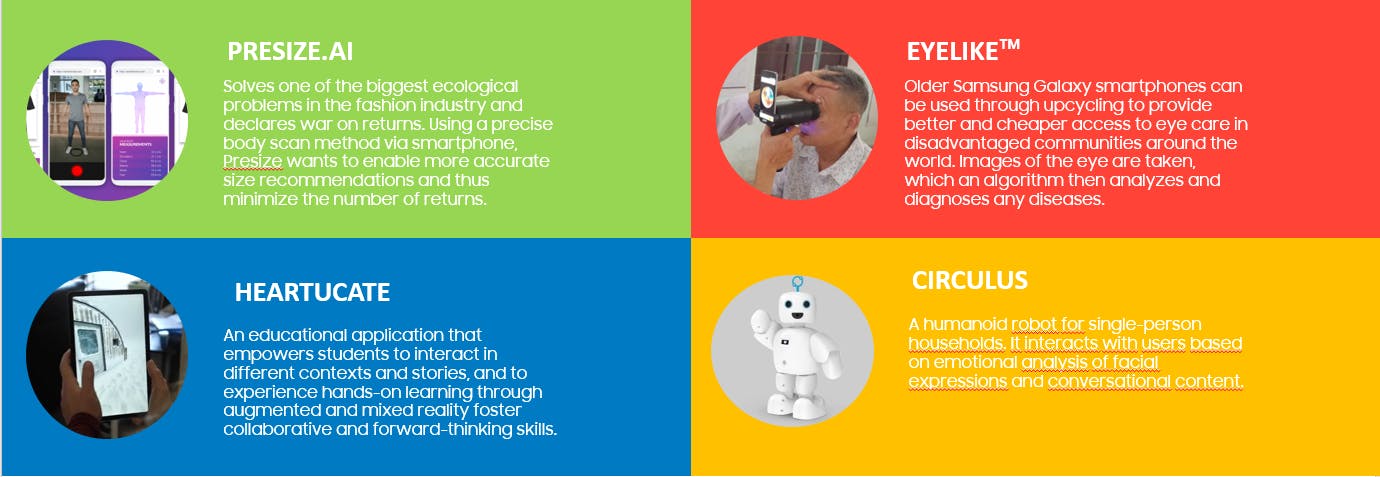
Solve for Tomorrow: Tech for Your Future
How do you envision your future? What role will technology play to build a better and more sustainable future? Collaborate with Samsung to make your ideas about the future society real! We support you in bringing your idea that benefits our society to life.
+++ The Deadline has been extended until the 04th of July! (11:59 pm) +++
✅ Challenge completed 🏁 Winner Congratulations to EP Checkup, Ingrid and Greenlist for winning the Challenge! See their pitches and the re-live of our final event here.🏆 Rewards 22.500€ prize pool + Samsung accelerator program "IMPACT-Phase" + product prizes
Background Information
To give you inspiration and background information you can find a knowledge base about relevant and promising technological trends and technologies. Note that the following content is meant to serve you as inspiration but should not exclude any other promising technologies.
In the attached document you can also find an overview and more examples!
Samsung product portfolio
The product portfolio in Germany includes mobile devices and wearables, notebooks, TV and AV devices, household appliances such as refrigerators, ovens, dryers, washing machines, monitors and displays, SSD storage, and more. Please refer to the Samsung website to gain an overview of the Samsung product range: https://www.samsung.com/de/
5G
The 5G technology is a lot faster and at the same time more efficient than the previous version 4G or LTE. In addition, the network of the future is much more variable than a 4G network. This means that the network will notice whether a few devices require a high data rate or whether many devices with comparatively low demand are in one place. The network can adapt and precisely distribute its performance according to the requirements determined. 5G should be able to connect up to one million devices per square kilometer simultaneously. In Germany, the network is currently under construction. However, 5G is already available in some pilot regions.
AI
Artificial intelligence (AI) involves the automation of intelligent behavior and machine learning. As the term itself, it describes computers that imitate cognitive tasks that we associate with human intelligence such as solving a problem or learning new things.
AI often includes reasoning, representation of knowledge, planning, learning, processing languages, perception, and the ability to move and manipulate objects.
AR/VR
Augmented Reality defines the expansion of actual reality with additional content. Additional information, pictures, and all kind of content can be linked-to real objects. By recognizing images or patterns via camera, the software reacts with a corresponding command such as playing an audio file.
Virtual Reality is a simulated reality in which the user can move. Unlike Augmented reality, it is not linked to any objects or surroundings. Both technologies are often is used in the field of computer gaming and virtual showrooms but also for educational purposes and medical training.
IoT
Internet of Things describes physical objects that are equipped with technologies in order to connect and exchange data with other devices. The application is often used in the field of smart home – including devices such as light fixtures, thermostats, home security, and displays which can be connected and controlled via devices such as smartphones or speakers. Other possible applications are the health sector, water supply, energy savings, and traffic monitoring.
Big Data
Big Data refers to large volumes of data and the digital technologies that are responsible for collecting and analyzing these data volumes that are too large or fast-moving to be measured with conventional methods. The sources are often intelligent agents, social media, credit and customer cards, smart metering systems, assistance devices, surveillance cameras, and vehicles. The applications are numerous: from the most well-known applications in the entertainment industry to exploring weather patterns or increasing the quality of educational material.
eID
An eID is an electronic proof of identity. It can be used to identify oneself to various services, such as mobile banking or contracting, to sign electronic documents, and to securely log on to official services. The German government is currently working on anchoring an eID derived from the identity card (“Personalausweis”) on smartphones. Samsung was involved in the development of the security architecture. Samsung devices such as the Samsung Galaxy S20, Galaxy Note20, and Galaxy S21 5G are the first devices to have the necessary security architecture and are equipped with a certified chip on which the ID card can be securely stored on the user's own smartphone.
Success Stories
To give you some more inspiration you can find other innovative ideas that utilized Samsung Devices in one of the 4 tracks.

© 2018- 2026 ekipa GmbH. All rights reserved.